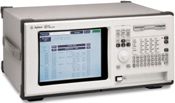Agilent / HP / Keysight 1672G
1672G Standalone Logic Analyzer
Description
The 1672G Series models have the option of a built-in, 500 MHz, 2 GSa/s oscilloscope that can be triggered by the logic analyzer. Some of the toughest hardware debug problems can be found only with the digital triggering capabilities of a logic analyzer and can be solved only with the analog resolution of an oscilloscope.
An optional pattern generator in the 1672G Series allows designers to substitute stimulus for missing subsystems during product development.
The 1672G Series helps simplify the capture and analysis of complex events with optional 256K or 2M deep memory. Deep memory is a valuable logic analyzer feature for debugging embedded microprocessor systems.
The units include a VGA resolution color flat panel display to help you find information quickly. The user interface helps to locate the source of design problems in less time. You have the option of using a mouse or the front panel to easily navigate through the user interface; a PC style keyboard is also supported. A compact all-in-one design helps save space on a crowded lab bench.
The number of channels (34, 68, 102,136) can be selected based on the application. An integrated oscilloscope can be triggered from the analyzer (and vice versa) and provides the ability to view analog and digital signals simultaneously. An integrated pattern generator of the 1672G provides stimulus for missing components, so that testing can begin before the system is complete.
Trigger functions of 1672G are depicted graphically and textually, and may be combined to create custom trigger sequences for capturing a complex series of events. Global markers of 1672G allow tracking a symptom in one domain to its cause in another domain.
The 1672G also provides documentation capability with which screen shots can be saved in standard TIFF, PCX, and EPS formats on dik. The acquired data can be saved in ASCII format for post processing.
The 1672G can be connected quickly and reliably to a wide variety of specific processors and buses. Inverse assemblers allow data to be viewed at the assembly level. A wide variety of IC clips, QFP adapters, QFP probes, and headers are available to help connect the analyzer to the system under test.
The 1672G serves as an oscilloscope, patteren generator and training kit when connected with options 003, 004 and 005 respectively.
Key Points
State/timing analyzer
Optional deep memory
Optional oscilloscope
Optional pattern generator
Trigger functions
Global markers
Documentation capability
Processor and bus
LAN
Probing
Optional PC-style keyboard supported
File formats for ASCII data and PCX/TIFF/EPS screen shots
Centronics printer port, GPIB and RS-232 programmability
LAN for remote operation via X-Windows and data transfers via FTP/NFS
23 predefined trigger functions
Specifications
Channel count: 68
Timing analysis speed: 250/500 MHz (full/half channels)
State analysis speed: 150 MHz
State clock/qualifiers: 4
Memory depth/channel: 64/128K (full/half channels)
Built-in display: color
LAN port: Thin LAN & Ethertwist
Input resistance: 100 kΩ ±2%
Parasitic tip capacitance: 1.5 pF
Minimum voltage swing: 500 mV, peak-to-peak
Threshold accuracy: ±(100 mV + 3% of threshold setting)
Maximum input voltage: ±40 V peak
Operating Temperature: 0°C to 55° C
Humidity: up to 95%







